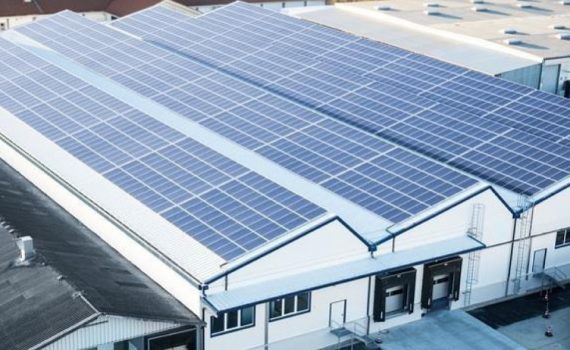An industrial solar system is a type of solar power system that is designed to meet the energy needs of a large commercial or industrial facility. These systems can be used to generate electricity, heat water, or provide both. Industrial solar system provider rajkot provides solar panels, solar inverters, and solar batteries for residential, commercial, and industrial use.
Understanding the Basics of Industrial Solar System
Industrial solar systems typically consist of the following components:
- Solar panels:
Solar panels are the most important component of an industrial solar system. They convert sunlight into electricity, which can then be used to power the facility or stored for later use. Solar panels are made up of photovoltaic cells, which are semiconductor devices that generate electricity when exposed to sunlight.
- Inverters:
Inverters helps in converting the direct current (DC) electricity which is produced by the solar panels into alternating current (AC) electricity, which is the type of electricity used by most commercial and industrial facilities. Inverters are necessary because solar panels produce DC electricity, while most commercial and industrial equipment requires AC electricity.
- Batteries:
Batteries can be used to store electricity generated by solar panels during the day for use at night or during times of peak demand. Batteries are a good option for businesses that want to reduce their reliance on the grid and have backup power in case of a power outage.
- Monitoring system:
A monitoring system tracks the performance of the solar system and provides data on energy production, consumption, and savings. This data can be used to optimize the system and ensure that it is operating at its maximum efficiency.
The cost of an industrial solar system can vary depending on the size of the system, the type of solar panels and other components used, and the location of the facility. However, the cost of solar systems has been declining in recent years, and many businesses are finding that long-term savings from solar energy can offset the upfront costs.
The benefits of industrial solar systems include:
Reduced electricity costs: Solar energy can help businesses save money on their electricity bills. The amount of savings will depend on the size of the system, the amount of sunlight the facility receives, and the cost of electricity in the area.
Increased energy independence: Solar systems can help businesses reduce their reliance on the grid, which can provide a measure of energy security. This is especially important for businesses that are located in areas that are prone to power outages.
Improved sustainability: Solar energy is a renewable resource that produces no emissions, which can help businesses reduce their environmental impact.
Also Read: Why Solar Energy Jobs Are The Wave Of The Future
If you are considering installing an industrial solar system, there are a number of factors you should consider, such as:
- The size of your energy needs:
The size of your solar system will depend on the amount of electricity your facility uses. A larger system will produce more electricity, but it will also be more expensive.
- The amount of sunlight your facility receives:
The amount of sunlight your facility receives will affect the amount of electricity your solar system can produce. If your facility receives a lot of sunlight, you can install a smaller system and still produce enough electricity to meet your needs.
- The cost of solar panels and other components:
The cost of solar panels and other components has been declining in recent years, but it is still a significant factor to consider. You should compare the prices of different systems to find the best option for your business. Industrial solar system provider rajkot are low in price but high in quality.
- The availability of government incentives:
There are a number of government incentives available for businesses that install solar systems. These incentives can help offset the cost of your system and make it more affordable.
Here are some additional things to keep in mind when considering an industrial solar system:
- The lifespan of solar panels is typically 25-30 years, so you should factor in the cost of maintenance and repairs over the lifetime of the system.
- You may need to obtain a permit from your local government before installing a solar system.
- You may also be eligible for government incentives, such as tax credits or rebates, that can help offset the cost of your system.
Conclusion
Once you have considered these factors, you can start to develop a solar energy plan for your business. With careful planning, you can install an industrial solar system from an industrial solar system provider rajkot that will help you save money, reduce your environmental impact, and improve your energy security.
Also Read: How to Choose the Best Commercial Solar Installer
